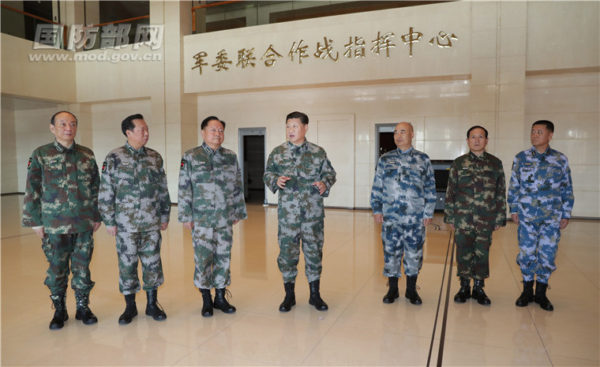◎ The leaner CMC confirms our analysis that Xi focused on consolidating his control over the military and ridding it of factional influence.
The new Central Military Commission (CMC) unveiled at the first plenum of the 19th Central Committee on Oct. 25 comprised only seven members.
The downsized CMC falls outside our earlier assessment. We wrote that Xi Jinping could expand the CMC with a new guard of junior generals to dilute the military body’s power and better secure his authority. This arrangement would prevent the concentration of power in the hands of a few influential military leaders, as in the case of Xu Caihou and Guo Boxiong during Hu Jintao’s tenure, and allow Xi to have greater control over the military.
While the downsized CMC doesn’t dilute its power, Xi’s authority over it is relatively secure as most of its members are trusted officials. The leaner CMC also confirms our analysis that Xi focused on consolidating his control over the military and ridding it of factional influence.
| 19th Central Military Commission (Downsized) | |||||
| No. | CMC | Name | Age | Post | Military rank (Date of promotion) |
| 1 | Chairman | Xi Jinping | 64 | Chairman | — |
| 2 | Vice chairmen | Xu Qiliang | 67 | Vice chairman | General (2007.07) |
| 3 | Zhang Youxia | 67 | Vice chairman | General (2011.07) | |
| 4 | Members |
Wei Fenghe | 63 | Defense Minister | General (2012.11) |
| 5 | Li Zuocheng | 64 | Chief of Joint Staff | General (2015.07) | |
| 6 | Miao Hua | 62 | Director, Political Work Department | General (2015.07) | |
| 7 | Zhang Shengmin | 59 | Secretary, Commission for Discipline Inspection of the Central Military Commission | General (2017.11) | |
Some observations about the new CMC:
- The Chairman and two vice chairmen positions were retained, but the CMC member slots were halved to just four.
- The inclusion of CMC Commission for Discipline Inspection secretary Zhang Shengmin reflects Xi’s anti-corruption priorities. Zhang’s presence should also dissuade those who might be thinking of opposing Xi’s military reforms.
- Vice chair Xu Qiliang has supported and observed Xi’s policies over the past five years and hasn’t shown any signs of disloyalty.
- Vice chair Zhang Youxia has combat experience from his participation in the 1979 Sino-Vietnamese War. Zhang’s father Zhang Zongxun served with Xi Zhongxun, the father of Xi Jinping, during the civil war in the 1940s. Then, Zhang Zongxun was vice commander of the Northwest Field Army and Xi Zhongxun was deputy political commissar.
- PLA Rocket Force commander Wei Fenghe received an exception promotion from Xi after Xi became General Secretary in November 2012. Wei should be officially named China’s next defense minister at the Two Sessions meeting in March 2018.
- Chief of Joint Staff Li Zuocheng was awarded merit of the first class for his valor with the 41st Army Group during the Sino-Vietnamese War, became a division commander in 1994, and was promoted to the rank of major general in 1997. But after that Li’s career stagnated because he reportedly offended Jiang Zemin, and his career only revived after Xi came to office.
- Political Work Department director Miao Hua received three exceptional promotions under Xi: A cross-force move from political commissar of Lanzhou Military Region to PLA Navy political commissar in December 2014, promotion to the rank of general in July 2015, and the appointment to his current post in August.
- CMC Commission for Discipline Inspection secretary Zhang Shengmin received four promotions in two years. Zhang and Wei Fenghe used to serve in the Second Artillery Corps, the predecessor to the PLA Rocket Force.
We believe that Xi trimmed the CMC to avoid potential backlash if he hands out too many exceptional promotions, and to give himself time to reassess the loyalties of senior generals while grooming the new guard of military leaders.
See our full report for the three reasons why Xi downsized the CMC.












